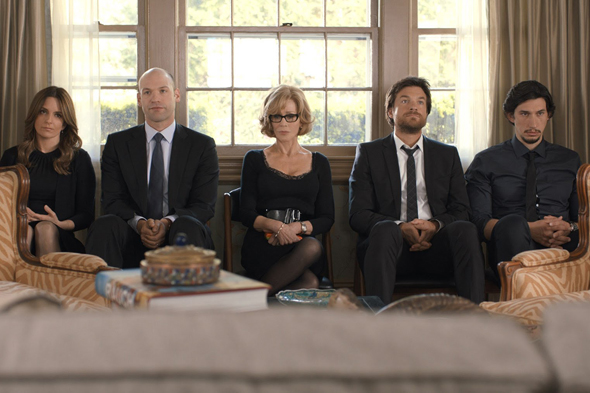
No one gets under your skin like your family can. Regardless of how much time you spend apart, old grudges have a way of boiling over as soon as you’re together. Or you may think you’ve become an infinitely wiser and more mature adult, but they still see you as the child you used to be. Your relatives also know you better than anyone, so attempts at hiding the pain you’re going through can quickly crumble when placed under the familial microscope.
This is Where I Leave You does an admirable job of capturing the intricacies and absurdities of family drama. Much like how the baby-boomer buddies in The Big Chill were reunited by the death of a friend we never see, the family members of This is Where I Leave You are brought together by the death of a patriarch we never see. The less-than-Jewish (and less-than-related-looking) siblings (Jason Bateman, Tina Fey, Adam Driver, Corey Stoll) are arm-twisted by their mother (a terrific Jane Fonda) into honoring their father’s dying wish that they all sit shiva to mourn him. The seven-day ritual provides ample opportunity for tempers to flare and hijinks to ensue.
The film is alternately hilarious and poignant, mining laughs and emotions from its funereal premise. Though best known for their TV work, main leads Bateman, Fey, and Driver acquit themselves especially well here. Bateman handles his character’s sad-sack midlife crisis better than he did in The Switch and makes a welcome pivot away from the smarminess of his roles in Horrible Bosses and Bad Words. Fey’s conflicted mother hen allows her to show more dramatic range than we’ve seen from the actress before. And Driver’s obnoxious black sheep is a joy to watch as he teases both his family and a childhood friend, nicknamed Boner (Parks and Rec‘s Ben Schwartz), who’s now trying to be taken seriously as a rabbi.
Alas, other members of the ensemble cast get shorter shrift. As a townie still nursing a crush on Bateman, Rose Byrne does well with what she’s given but barely dodges manic pixie dream girl status. Stoll’s oldest brother is an uninteresting and underwritten afterthought, disappearing from the film (or perhaps just failing to make an impression) for stretches at a time. And Timothy Olyphant’s character, an old flame of Fey’s who suffers from some vaguely defined and constantly shifting form of brain damage, grinds the film to an awkward halt every time he appears.
Worse, some family members aren’t so much characters as they are a single personality trait broadcast at high volumes. As Stoll’s wife, Kathryn Hahn just wants to get pregnant, goddammit. Or as Fey’s work-obsessed husband, Aaron Lazar only exists to bark business jargon into his cellphone and ignore his wife and children. For a film that’s so character-driven, This is Where I Leave You‘s reliance on stock types can be unfortunate. There are even moments when characters go as far as to announce their archetypes out loud, like Lazar saying “I’m an asshole,” or Driver stating “I’m the family screw-up,” as if it weren’t already very obvious, thank you very much.
But the film largely makes up for those failings with its willingness to avoid neat resolutions and embrace the messy complications of life. Screenwriter Jonathan Tropper, adapting from his own novel, allows his conflicted characters to develop and change without swooping in to fix all their problems by the end. Tropper’s script is full of genuine pathos, believable conflict, and revealing dialog. (One such gem from Fey: “We want the people we can’t have and shit all over the ones we can. Wash, rinse, repeat.”) A few too many heart-to-hearts end with hugs and I-love-yous, but the comedic moments help to keep the sentimentality (mostly) in check.
This is Where I Leave You often feels like the best parts of familiar movies. It’s The Big Chill‘s conflicted bonding, but minus the capitalist manifesto. It’s Garden State‘s starry-eyed coming of age and indie soundtrack, but minus the twee. It’s the close-quartered zaniness of Death at a Funeral, but with only a fraction of the poop. Yet the film has a way of shifting between gut-busting laughs and heart-wrenching emotion that’s very much its own. The result is one of the funnier comedies and more satisfying dramas you’re likely to see all year. It gets under your skin the way that only family can.
This is Where I Leave You opens on Friday, September 19.